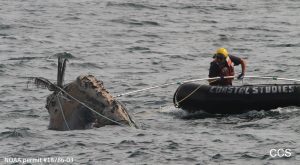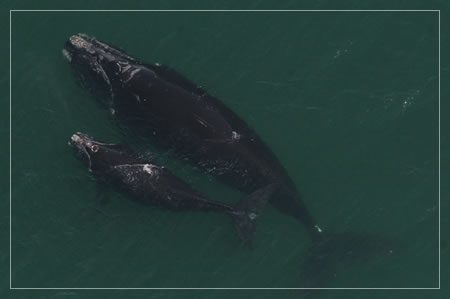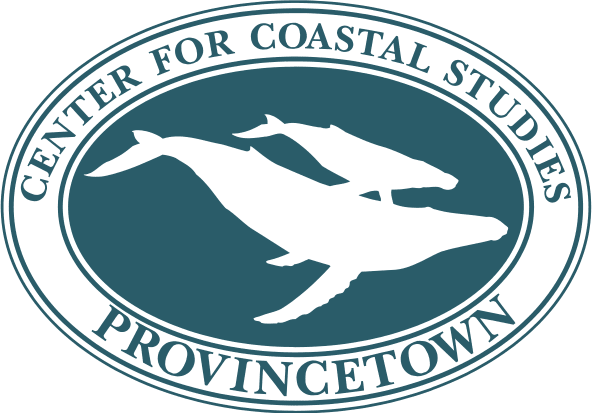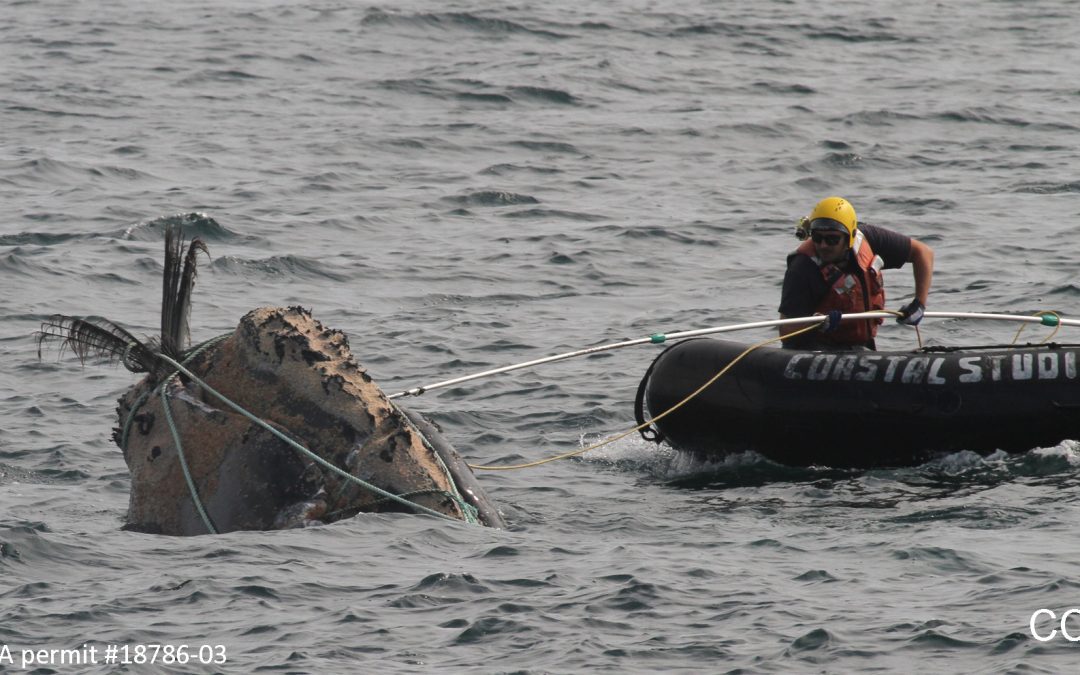On Friday, August 2 the Marine Animal Entanglement Response team (MAER) from the Center for Coastal Studies (CCS), in collaboration with the Northeastern Fisheries Science Center (NEFSC) and the National Marine Fisheries Service (NMFS) partially disentangled a North Atlantic right whale, one of only about 400 individuals left, east of Cape Cod.
The entangled whale was initially discovered in the Gulf of St. Lawrence, Canada, on July 4, 2019 by Transport Canada. Despite a horrific entanglement, the whale was highly mobile. On July 19 it was spotted again by an aerial survey team from NEFSC and the Canadian Department of Fisheries and Oceans. A response team from New England Aquarium (NEAQ) was in the area and succeeded in attaching a telemetry buoy to the whale to track its movements for disentanglement.
Over the next two weeks the whale traveled east, out of the Gulf, then south, past Newfoundland and Nova Scotia. During that time Canadian disentanglement teams made several attempts to free the animal and were able to make some cuts to its entanglement.
 By August 2, after 900 miles of travel, the whale was 60 miles east of Cape Cod and close enough for the CCS MAER team to launch a disentanglement attempt. With NMFS relaying telemetry data, the NEFSC aerial survey team flew ahead of the CCS on-water teams to locate the whale and guide responders aboard the R/V Ibis and R/V Shearwater to the scene.
By August 2, after 900 miles of travel, the whale was 60 miles east of Cape Cod and close enough for the CCS MAER team to launch a disentanglement attempt. With NMFS relaying telemetry data, the NEFSC aerial survey team flew ahead of the CCS on-water teams to locate the whale and guide responders aboard the R/V Ibis and R/V Shearwater to the scene.
The physical condition of the whale had deteriorated significantly in the weeks since it was first seen. It was thin and covered in whale lice, both signs of poor health. Baleen was protruding from its mouth and line was wrapped around its head, effectively wiring its mouth shut and preventing it from feeding. It had numerous open wounds and its right flipper was pinned to its body.
The entanglement was complex, and the configuration changed as the whale dove and resurfaced. The team added large floats and sea anchors to the entangling gear in an effort to slow the whale and keep it at the surface. Despite its poor condition, the whale was still very dangerous and made every attempt to evade approaches from the responders. Between bouts of relative calm, the whale would thrash and lash out with its flukes.
Over a period of several hours the MAER team, maintaining a safe distance from the agitated animal, used a specialized arrow fired from a crossbow to damage and weaken the lines around the whale’s head, and hooked knives attached long poles to cut through several carefully selected lines. Eventually the whale submerged and within minutes the buoys and sea anchor went slack. Shortly thereafter the whale was seen quarter of a mile away.
The whale still had wraps of line through its mouth and over the top of its but these may be shed as the whale resumes feeding. “While the chances of its survival are much improved, the whale is by no means out of the woods” said Scott Landry, director of MAER. “Many people have worked very hard on this case over the last few weeks. We have done all we can do for this whale. This case really highlights that preventing entanglements will be key to conserving this species.” NEAq identified the whale as #3125, an 18-year-old male last seen in Cape Cod Bay in March. The network of entanglement responders will keep an eye out for the whale and monitor it for any signs of improvement or decline.
The MAER team removed over 300 feet of very heavy rope from the whale. This work, combined with analysis of photographs of the entanglement, adds to a greater understanding of how, where, and when entanglements occur, and informs decisions regarding entanglement mitigation and prevention.
North Atlantic right whales, Eubalaena glacialis, are among the rarest of the baleen whale species, with a population of just 411 individuals. Although protected from hunting, the population still carries heavy losses from entanglements and ship strikes. Low reproductive rates also contribute to the slow recovery of this species. Just seven calves were born in 2019, and at least eight individuals – including five breeding females – have died. Several more are known to be entangled.
Boaters are urged to report any entanglement sightings of whales, sea-turtles or sharks to the MAER team (1-800-900-3622) or the US Coast Guard on VHF 16, and to stand by the animal at a safe distance until trained responders arrive.
CCS disentanglement work is supported by grants from the National Marine Fisheries Service (NMFS), the Massachusetts Division of Marine Fisheries (MA-DMF), and the Massachusetts Environmental Trust. Support is also provided by the Broad Reach Fund of the Maine Community Foundation, the Pegasus Foundation, the Hermann Foundation, the Mary P. Dolciani Halloran Foundation, the Summerlee Foundation, and contributions from CCS members. All disentanglement activities are conducted under a federal permit authorized by NOAA.

Our Work
Humpback Whale Research
Right Whale Research
Marine Animal Entanglement Response
Marine Geology Department
Water Quality Monitoring Program
Marine Fisheries Research
Seal Research
Shark Research
Marine Education
Interdisciplinary
Marine Debris and Plastics Program
Marine Policy Initiative
Cape Cod Climate Change Collaborative
Publications


